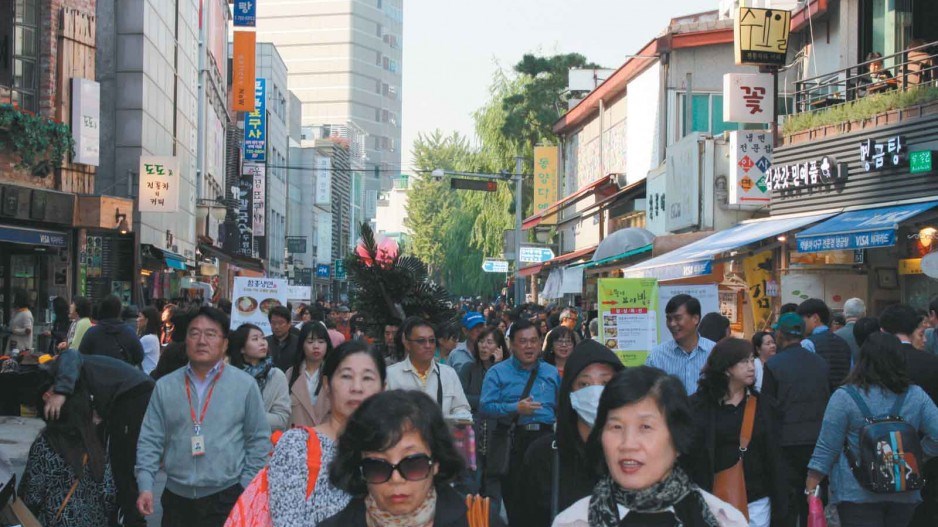SEOUL - Wedged as it is between two Asian economic giants – China and Japan – South Korea sometimes gets overlooked by Canadian businesses as a place to invest or develop markets.
With 50 million people, South Korea’s population is not that much larger than Canada’s. But South Korea has something no other country in the world has: free trade agreements with 47 countries, including Canada, and is in the process of concluding a free trade agreement with China.
“Once completed, it will give investors convenient access to the world’s second-largest economy from Korea,” Kiwon Han, head of Invest Korea, told foreign journalists and investors at the annual Foreign Investment Week (FIW)last month in Seoul.
“No Asian country can give you this extended market access without barriers except Korea.”
Once the deal with China is concluded, South Korea will have free trade with 70% of the world’s leading economies, said Kim Youngsam, director general for investment policy for the Ministry of Trade, Industry and Energy (MOTIE).
"Korea is quickly becoming a free trade hub,” Kim said.
South Korea has been recognized as one of the easiest places in the world to do business. The World Bank Group recently ranked it fifth on its Doing Business Index (Canada’s ranks 16).
Korea also has world-class companies and industries, including the largest electronics company in the world (Samsung), second-largest TV manufacturer (LG Electronics Inc.), and fourth-largest vehicle manufacturer (Hyundai Motor Co.). It has the fifth-largest container port in the world and is the second-largest shipbuilder.
It also has an affluent middle class with a taste for western name brands and products, which may explain why foreign businesses, from Microsoft Corp. (Nasdaq:MSFT) and Lululemon Athletica Inc. (Nasdaq:LULU), are planning to set up shop in South Korea.
But it’s value-added products and processes that may hold the most promise for Canadian products and technology.
Gordon Shank Consulting, a Burnaby-based company that develops materials for the ballistics and composites industries, recently struck a partnership with Hyundai Fiber Co. Ltd. to turn B.C. wood waste into a “continuous filament” to a create a biofibre similar to fibreglass.
“We’ve come up with a fibre made out of lumber industry wastes that is designed to replace fibreglass,” Shank told Business in Vancouver. “Its density is on par with DuPont’s Kevlar.
“Korea has been my most successful trading partner over the last 20 years. We’re almost approaching $2 billion in revenue [between Korea and third-party countries]."
Other areas of high-tech manufacturing and research and development that present potential opportunities for direct investment or partnerships with B.C. sectors include biotechnology (including stem-cell therapies), health and wellness, software, visual special effects for Korea’s booming film and TV sector and hydrogen fuel cell technology.
In a breakout session on new technology, Jeong Heon Kim of Hankook Tire talked about how his company combined its expertise in tire and battery manufacturing to create innovative components in certain types of hydrogen fuel cells.
Korean companies and researchers have already inked deals with Canadian fuel cell companies such as Burnaby’s Ballard Power Systems (TSX:BLD) and Mississauga-based Hydrogenics Corp. (TSX: HYG). South Korea is also the largest geographic market for Burnaby-based Greenlight Innovation, which makes hydrogen fuel cell testing equipment.
“I think there is potential for further collaboration,” Kim said.
Hydrogenics CFO Bob Motz, one of several Canadian investors at the FIW conference, said Korea’s incentives for clean and renewable energy are particularly favourable to fuel cell technology.
“Korea has the highest tariff support for fuel cells in the world,” Motz said.
Korea is also a leader in developing next-generation lithium-ion batteries – an area in which several B.C.-based companies have expertise, including E-One Moli (Molicell), Delaware Power Systems and Corvus Energy, which sources its battery cells from South Korea.
It’s not just tech companies that are being drawn to South Korea, however. The Canada-Korea FTA puts many Canadian resources back on an even footing with the U.S. – seafood, for example.
Tariffs for both Alaskan and B.C. seafood were in the 10% to 30% range, so when the U.S. signed a free trade agreement with South Korea, B.C. seafood exporters simply could not compete with Alaskan producers.
“This just puts us back on the same level of opportunity as the Alaskans,” said Christine Burridge, executive director for the BC Seafood Alliance.
“This is a relatively wealthy society that likes seafood. I think there’s enormous potential.”
Jay Lee, CEO of the Vancouver investment firm Columbia Capital, said there are also opportunities for real estate development in South Korea.
His firm used to raise capital from Korea and invest it in Canadian resource plays. Now his company is raising capital – largely from China – for a private equity fund to develop real estate projects in the Incheon Free Economic Zone (FEZ) – one of eight under development.
These FEZs are designed to cater to foreign companies and will feature foreign schools, hospitals, clinics, casinos, hotels and housing for foreign workers.
James Kim, vice-president, Asia Pacific, for the venture capital firm Vitamine C, said he believes there are opportunities in these FEZs for Canadian satellite schools, educational software and medical clinics. •
BIV reporter Nelson Bennett attended Foreign Investment Week, October 29 to 31, in Seoul, South Korea, at the invitation of the Korea Trade-Investment Promotion Agency (KOTRA). Watch for BIV’s Asia Pacific quarterly in the December 2–8 issue for more coverage on investment opportunities in South Korea.




